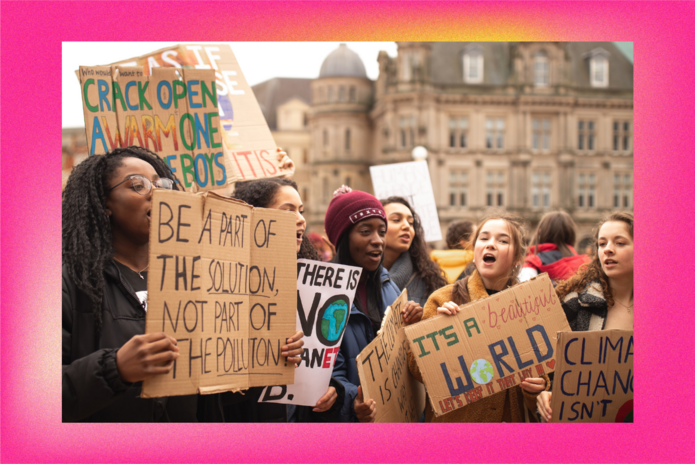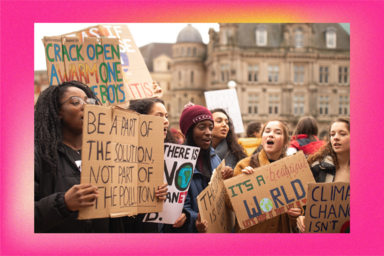The Intergovernmental Panel on Climate Change (IPCC) recently released their 2021 climate change assessment* — a grim detailing of the earth’s current state as well as a serious cry for global environmental reform. Eight years in the making, the report addresses the most up-to-date findings from scientists and experts concerning climate change, including a comprehensive summary for policymakers. The full report sums up to over a thousand pages, but the general gist is clear: our earth is in severe danger, and we need to take climate change seriously.
The report claims that “climate change is already affecting every inhabited region across the globe with human influence contributing to many observed changes in weather and climate extremes.” Which is a given — think about the majorly deathly heat waves we’ve experienced this summer, like in Washington and Oregon. And what about the Miami condo collapse that happened back in June, that was largely caused due to rising sea levels as a result of climate change? In July, the ocean even caught on fire. If that isn’t reason enough for why there needs to be extreme change in environmental policy, I don’t know what else is.
According to the report, we will not even be able to limit global warming to 2 degrees Celsius unless there is an immediate and drastic decrease in greenhouse gas emissions — and based on current rates of greenhouse gas emissions, we’re nowhere near reaching that goal. In 2019, the United States alone released 6.6 billion metric tons of greenhouse gases, with carbon dioxide accounting for the majority of that percentage. And although China was reported to be the lead contributor to global greenhouse gas emissions in 2014, the United States is close behind, accounting for 15% of global greenhouse gas emissions that same year. In 2016, almost 50 billion tons of global greenhouse gases were emitted.
Although it is clear that reducing greenhouse gas emissions may be the key to saving our planet, there is unfortunately a huge favor towards utilizing fossil fuels over natural gas that makes it almost impossible to scale back. The fossil fuel industry is a multibillion dollar industry; in fact, in 2018, the industry churned out a total revenue of 181 billion dollars in the United States. The industry also employed 1.7 million Americans in 2019, and a common worry among citizens and policymakers is that reverting to more natural and renewable alternatives would hurt the economy.
However, I am here to argue — and beg — that transitioning to more renewable alternatives such as solar and wind power would actually be good for the economy — and more importantly, would help save our planet. According to RMI, a non-profit organization committed to building a cleaner economy, there is huge opportunity for economic development from establishing clean energy industries in rural communities. In fact, it is projected that annual revenues from solar and wind projects could surpass 60 billion dollars by 2030 — and if we invested even more in these types of industries, even more profit could be made. And even if changing to these renewable power methods didn’t benefit the economy, the economy ultimately won’t matter if there is no earth. In other words, we have nothing to lose.
But this report also isn’t new news. Scientists and climate change experts have warned us for years that we need to make serious alterations in order to save our earth from impending doom — yet these warnings have been repeatedly ignored. In 2018, the IPCC urged that we need to cut back on carbon emissions by 45% by 2030 to maintain the rise in global temperatures below 1.5 degrees Celsius. At the Icheon press conference a few years ago, Jim Skea, co-chair of IPCC Working Group III, said, “We have not identified any pathways that get to 1.5 degrees Celsius without carbon dioxide removal.” But many politicians and policymakers didn’t listen to Skea or the IPCC report from 2018 — otherwise, we wouldn’t be in this bad of a situation now in 2021.
So, why hasn’t anything been done? Though there are multiple reasons for our negligence, the fact of the matter is that climate change has largely been blamed on individuals, and not on institutions and policymakers. Big corporations like Amazon, who emitted over fifty million metric tons of carbon dioxide in 2019, are hardly condemned for their carbon footprint. But who is typically blamed for climate change and the catastrophic damage done to our earth? Us — the individuals.
The narrative is always that we, as consumers, need to do better and lessen our carbon footprint ourselves. We need to drive less, bike more. We need to make more conscious purchases, and not buy from multibillion dollar corporations. We need to eat more vegetables, and eat less red meat. And although all of that is incredibly important and does help a little bit, we as individuals cannot fix climate change on our own — it is up to large institutions, corporations, and policymakers to enact real change that will lead to big results — the kind of results that we desperately need right now.
But what happens if nothing changes? Scientists have projected the worst. If climate change is not globally addressed by 2050, it is predicted that our air will be practically unbreathable and that we will have to constantly wear masks when we are outside. Temperatures may even rise to 140 degrees Fahrenheit in some parts of the world, causing millions of people to die from heat-related illnesses and massive wildfires. Water will become scarce, and you may even have to pay for water in public restrooms. Sea levels will rise, flooding communities and forcing people out of their homes. Various species will lose their habitats, with some even becoming extinct. And that’s just the tip of the iceberg.
This is a plea from a 21-year-old college student to please, please, take climate change more seriously. We need to act now and put pressure on policymakers to enact laws and policies like the Green New Deal that will help save our planet. And yes, being conscious of your individual carbon footprint will help, but we should also hold big institutions and corporations accountable.
Although our country and world may be more split apart now than ever, we need to work past our differences and come together to make serious reform. Because ultimately, our earth depends on it.
Studies:
*IPCC. (2021). “Climate Change 2021: The Physical Science Basis.”


